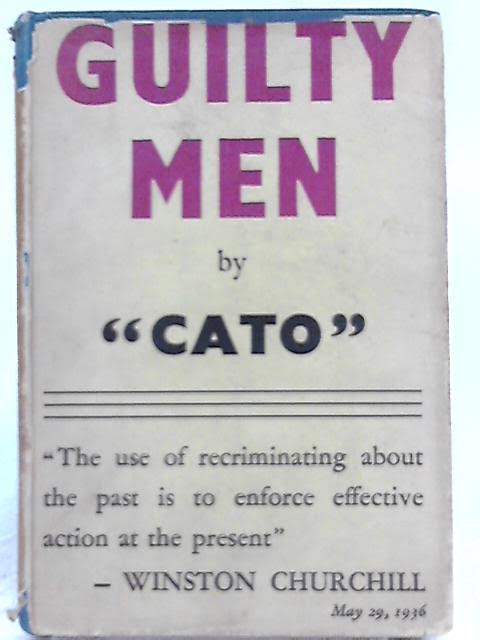Prologue to Guilty Men
Crimes Against National Character
During the month of July, 1940, a fiery little book entitled Guilty Men was published in England. Authored anonymously under the pseudonym “Cato”, the book quickly sold tens of thousands of copies and eventually hundreds of thousands. It would go on to claim an honored niche in both the political history and literary lore of the British people. To this day, Guilty Men resides firmly on the reading lists of British schoolchildren. As it will forever.
It should be remembered that in July of 1940, after France had fallen and all of Europe lay under the heel of Adolf Hitler, Britain stood alone and almost defenceless against the might of Nazi Germany. Invasion of the British Isles appeared to be Hitler’s logical next step. At that point in World War Two no one could have foreseen the course of subsequent events. Certainly no one could have predicted the precise outcome. Only one thing was certain: Britain’s survival hung by a slender thread.
What was the stuff of the little book entitled Guilty Men that resounded so compellingly for the people of Britain eight decades ago, and which continues to make the book a touchstone of moral clarity? Simply this: rage. And equally this: recrimination.
Rage and recrimination, because Britain’s road to the brink of destruction had been paved with little else but human folly.
 The guilty parties of Guilty Men were easily identifiable. They were the political leaders of Britain during the 1930s. They were the men whose imprudent caution through all those years “which the locusts ate” effectively allowed Hitler’s power to grow and his aggressions to profit. They were the men whose neglect of their country’s defences through all those years “while the dominos fell” was tantamount to criminal. In foreign policy they were the appeasers. In domestic affairs related to military preparedness they were the do-nothings. They were weak, visionless, spineless men. They were deluded, easily deceived men.
The guilty parties of Guilty Men were easily identifiable. They were the political leaders of Britain during the 1930s. They were the men whose imprudent caution through all those years “which the locusts ate” effectively allowed Hitler’s power to grow and his aggressions to profit. They were the men whose neglect of their country’s defences through all those years “while the dominos fell” was tantamount to criminal. In foreign policy they were the appeasers. In domestic affairs related to military preparedness they were the do-nothings. They were weak, visionless, spineless men. They were deluded, easily deceived men.
The little book named them all.
Starting at the top with the Prime Minister, Neville Chamberlain, and on down the list of ministers and advisors, Guilty Men inflicted upon the culpable the public humiliation that was so richly their due. The book showed how, at every station of opportunity to challenge Hitler, to impede Hitler, to undermine and potentially unseat the dictator, these men of high office and national responsibility – missed the train. The book detailed too how promise after promise on their part to strengthen Britain’s fighting ability and maintain at least parity in armaments with the German menace – were never kept.
That was the stuff and substance of the little book, but what was its ultimate message? Profoundly this: the guilty men stood in the dock not merely because they had acted unwisely and often stupidly. No, they deserved history’s harshest verdict for a crime much less excusable. They were guilty because they had betrayed the character of their country.
Before the years of appeasement and negligence, Britain was a global power of supreme fortitude and vigilance. Say what you will about the means by which it went about building and governing its empire, no one can dispute that Britain’s posture in international matters came informed by uncompromising vigor in support of its interests. This was a bearing backed by force and which indulged no backsliding in the name of accommodation, nor concessions under the timid flag of tolerance. Categorical, resolute, adamant defence of Britain’s leading place in the world formed the backbone of its national character … prior to the advent of the guilty men.
With those words we leave the indignity of Britain in the 1930s and take ourselves across the ocean to a contemporary account of Guilty Men. This new version chronicles the betrayal of American national character in 2016 that has deeply stained the history of the United States.
………………………….
On January 20, 2017, a man patently, demonstrably, staggeringly unfit to hold the office of president of the United States took control of the White House. But this is not a book about that man, whose name we prefer to keep from sullying these pages. It is not about the egocentric blowhard whose public utterances, social media scribblings and personal conduct had long indicated he simply could not help being who and what he was. That depressing subject will serve as fodder for countless other, far heavier, studies.
Nor will this book analyze the appalling judgment of the American people, specifically those who betrayed the character of their country when they voted for an authoritarian personality during the Republican primaries, and those who – ignoring relentless evidence that the would-be Mussolini was also a compulsive liar, sociopath, narcissist, and proud sexual predator to boot – voted him into the office once occupied by George Washington, Thomas Jefferson, Abraham Lincoln, and Franklin Roosevelt.
The task of this book is rather to perform an act of memory, much as was done in the original Guilty Men. Some things in the life of a nation must never be forgotten. If the path of American history is to resume its course on tracks built of a regard for common decency and respect for truth, then the men who twisted and uprooted those tracks in 2016 must be taken before the bar of justice, even if the justice is delivered only by historians.
Accordingly, the following pages will shine a light on the behavior of the principal leaders of the Republican Party, and other culpable men, who betrayed the character of their country during the seventeen months that began on a mid-June day in 2015. That was the day a chubby, boorish, barely literate, comically-coiffed creator of a fraudulent real estate “university” came down an escalator in a Fifth Avenue tower and proceeded, well nigh immediately, to identify himself as a demagogue. That was the day the same man began shredding the notion that American political discourse should be governed by a minimum level of respectability and at least a surface regard for truth.
With any luck, the rage and recrimination herein will serve as an enabling act of memory, and thereby help future generations of Americans avert similar national shame.


 The guilty parties of Guilty Men were easily identifiable. They were the political leaders of Britain during the 1930s. They were the men whose imprudent caution through all those years “which the locusts ate” effectively allowed Hitler’s power to grow and his aggressions to profit. They were the men whose neglect of their country’s defences through all those years “while the dominos fell” was tantamount to criminal. In foreign policy they were the appeasers. In domestic affairs related to military preparedness they were the do-nothings. They were weak, visionless, spineless men. They were deluded, easily deceived men.
The guilty parties of Guilty Men were easily identifiable. They were the political leaders of Britain during the 1930s. They were the men whose imprudent caution through all those years “which the locusts ate” effectively allowed Hitler’s power to grow and his aggressions to profit. They were the men whose neglect of their country’s defences through all those years “while the dominos fell” was tantamount to criminal. In foreign policy they were the appeasers. In domestic affairs related to military preparedness they were the do-nothings. They were weak, visionless, spineless men. They were deluded, easily deceived men.






